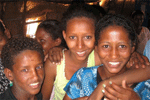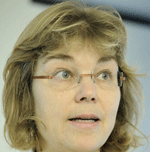Eritrea
|
Once praised as one of the most promising countries in Africa, the country has become the victim of an
authoritarian and militarized regime. The country has rapidly descended into intolerable levels of political
repression, leading to abject poverty and “social anomie,” an environment that precludes fulfilment of its
international commitment to sustainable development, economic growth and progress. The fundamental
obstacle of political repression can only be removed with the help of outside pressure on the Eritrean
Government.
|
Published on Tue, 2011-11-29 08:44
The European Union (EU) must support the people of Eritrea after the government of that African country decided to terminate its ongoing EU aid programmes, said Mirjam van Reisen, chair of International Social Responsibility at Tilburg University and director of Europe External Policy Advisors (EEPA). |
Published on Wed, 2011-11-09 07:37
The European Union (EU) should change its policy towards Eritrea, says Mirjam van Reisen, professor of International Social Responsibility at Tilburg University. The people are better of if the EU would spent its allocated subsidy for Eritrea on housing and education of the Eritrean refugees in Sudan, South Sudan, Libya, Egypt or Yemen, adds Van Reisen, also founder and director of Brussels-based Europe External Policy Advisors (EEPA). |
Published on Fri, 2011-09-23 11:32
Sources: IDN-InDepthNews, EEPA The European Union (EU) and the European Parliament censured the Eritrean President Isaias Afewerki for sending independent journalists and "thousands of Eritreans" to jail, and urged the African Union to exert pressure on the government to free prisoners. “Europe finally condemns Eritrea; but does it do anything to support the Eritreans?” asked Professor Mirjam van Reisen, founder and director of Brussels-based Europe External Policy Advisors (EEPA). |
|
Eritrea has been led for almost 20 years by a Government that evolved from a liberation movement and whose right to rule has not been confirmed in free and fair elections. Political repression has never been so glaring as during the first decade of the new millennium. The Government is continuously frustrating the economic and developmental aspirations of the people. In the face of new sanctions imposed by the UN Security Council in December 2009, economic recovery and social development will continue to be unreachable goals.
|
|
With no working constitution, functioning parliament, independent judiciary, free press, bureaucratic accountability or officially published national budget, Eritrea, the most militarized country in the world, lacks the mechanisms required to tackle the current global crisis. The shrinking global economy has drained remittances to Eritrea, while prices of food and fuel have skyrocketed. The country needs an immediate transition to a democratic system of governance that has the support of the international community. Humanitarian aid monitored by independent international NGOs appears to be the most effective emergency plan to save the lives of helpless Eritreans.
|






